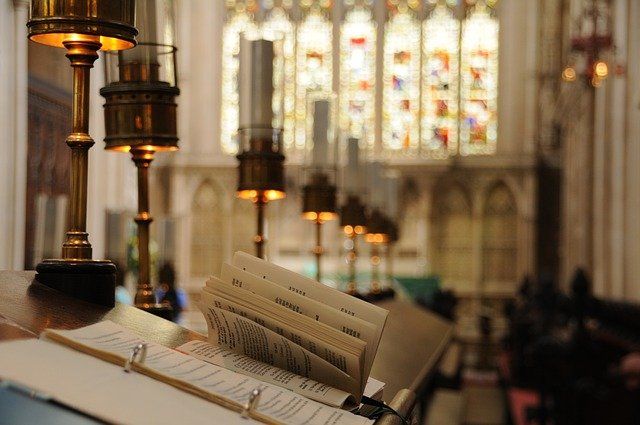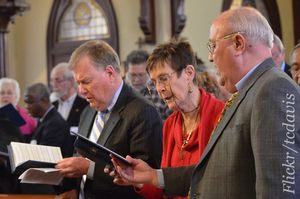In the previous two articles I have considered the nature and the purpose of praise and worship. We now turn to the practical matter of the conduct of our meetings. Those leading the service must walk a middle ground between a dead formality on the one hand, and on the other, a casualness which puts God on the same level as ourselves. Our praise and worship must convey not only the boldness and joy that flows from us being the adopted children of the almighty God, but also the godly fear which he inspires in us.
Furthermore, as we saw last month, there is to be the freedom of the Holy Spirit in our meetings, but that freedom must always be channelled within the boundaries of Scripture. If our praise and worship are truly Spirit-led, they will conform to the norms and doctrines of the Bible.
We have a God who is greater than us, who is higher than us ‘as the heavens are higher than the earth’ (Isaiah 55:9). Yet he is also one who has come to be among us, and has adopted believers as his children. There must, therefore, be a due mixture in our services of intimacy and awe.
The place of meeting
Some say that the physical location or building where we meet to offer worship and praise does not matter. In one sense that is true. But I heard a story of a church where a visitor noticed a nasty stain on the wall behind the pulpit. A few years later he again attended that church, and the stain was still there — they had done nothing about it in all that time.
What message is projected by such neglect? The church concerned may have felt they were saying, ‘God is only worshipped with our hearts; it doesn’t really matter what state the building is in’. But what they are actually saying to people who come in is, ‘God can be worshipped in any old shoddy way. It doesn’t really matter. It’s not really important’.

So even the way we maintain our buildings proclaims a message. But we need to understand why this is. Paul reminds us that ‘God … does not dwell in temples made with hands’ (Acts 17:24). Worship is not augmented by ornate surroundings and such things as vestments, candles and processions. To take that line, as many do, is to confuse the Old Covenant with the New. Under the Mosaic covenant there were many symbols which were essential to worship, such as the priestly vestments, the sacrifices, the burning lamps and rising incense. But these symbols have passed away (Hebrews 8), having been fulfilled in Christ. They should no longer feature in Christian worship.
Why, then, do the physical surroundings for our church services matter? It is simply a question of demonstrating to others our respect for God. When people visit our homes we normally tidy up and clean the house, out of respect for them. If we neglect our worship environment, we declare that it is too much trouble for us to honour God in this small way. What does this imply regarding more important things?
Public prayer
It is in public prayer that we make our most direct approach to God during a service of worship. It is no exaggeration to say that the manner in which we do so will tell people more about the kind of God in whom we believe than the whole of the rest of the service.
In our public prayers we either proclaim a God who is personal, or a God who is distant, a God who is just a casual friend, or a God who is a lofty, eternal God. If we say that God is our Father, but we speak to him as if he is some distant being whom we don’t personally know, then no matter how much we preach a personal, intimate relationship with God, people are not going to believe us.

If, on the other hand, I chat to God in a casual way; if I treat him as if he is my pal, and yet I preach to people that God is lofty and awesome, the Maker of heaven and earth, they are not going to believe me, because they have just heard me talk to him like an equal.
Reading Scripture
It is important to realise that the reading and hearing of Scripture is an act of worship in itself. This can be overlooked if we treat the Bible readings as a ritualistic or liturgical sequence, or if (at the other extreme) we regard them simply as information on which to base the sermon.
The Bible is God’s word, and it must be read clearly and with reverence and feeling. It is not uncommon for the person reading the Scripture to stumble over its words because they have not troubled to peruse the passage in advance. They are caught out by unfamiliar Hebrew names, for example, or fail to place a correct emphasis on words, so distorting the intended meaning.
Singing
If we sing with a bored expression on our face; if we have no joy in praising God; if we are cold and dull; this surely communicates something to those around us. If, on the other hand, we sing with joy in our hearts and a thrill in our voices, this also declares something about our relationship with God. This is self-evident but often forgotten.
However, we must also beware of singing with nothing more than emotion. The kernel of our praise is telling what God has done for us in Christ. If our praise is just emotionalism without content, then it cannot function as a declaration of God’s glorious and gracious work of salvation.
This surely means that the words we sing must have significance, and must be chosen with thought and care. It is the responsibility of the spiritual leaders of the church to ensure that whatever is sung is faithful, true and edifying.
It must not be forgotten that huge numbers of hymns were written in the past, and the ones we have in our hymn-books are generally those which have been regarded as superior in quality by generations of Christians. We should realise that this selection process has not had time to occur with modern hymns and choruses and so we should exercise care and discernment in picking only the best.
There are some who say that God is not interested in the actual music, so it does not really matter what the melody is like. It is true that God is not impressed by the quality of our music. But he is concerned about the impression we are giving of him to others as we praise. Do we sound like those whose cup is overflowing with thankfulness, or like people at a funeral parlour? Let us not forget what a profound impression was made on the Philippian jailer by the singing of his prisoners in Acts 16.
The question of culture
The matter of culture is important here. If we were to transplant a North American service into the middle of Africa, then the congregation would get a very different impression of what God is like, because they would see the service as the product of an alien culture.
Africans would see us as dressed in clothes that are alien to theirs, and they would see us as expressing joy in a way they might not understand. To them, our music would seem very sombre, dull and formal. So, in order to properly praise and worship God, they would need to consider carefully how the necessary combination of joy and deep reverence should be expressed in language and actions appropriate to their own culture.
If our service were transplanted to certain parts of Europe they might think us cool in our relationships with others if we did not kiss one another on the cheek. What is appropriate in one culture may not be in another. Unless we are aware of these cultural differences, we will fail to communicate the message of Christian unity and send a distorted message of what God is like.
Dress
Culture expresses itself further in the matter of dress for our public services; only in our case, we have to grapple with a plurality of mini-cultures within the same country or even the same city! This is an area that causes considerable contention, and some may consider it too trivial to mention. Nevertheless, I think biblical principles can give us guidelines even here.
If all the men in the building were dressed up in tails and bow ties, and all the women were wearing full-length dresses, what would visitors make of it? They would feel out of place, and get an impression that God can only be approached after an unusual attention to outward adornment. Of course, God is worthy of our very best, but ‘best’ cannot be equated with pretentious formality. But, equally, to attend a meeting wearing jeans and T-shirts, as if we were going to a ball-game, can also distort the message of what God is like.
The golden rule is that our dress should not attract attention, for whatever reason. People have not come to church to admire or deplore the way we dress. Careless and sloppy dressing suggests a lack of respect, while unusual or unconventional clothing may indicate a desire for attention. Obviously expensive or ostentatious dress may be an indication of pride. The only offence people should feel as they come to our service should be the offence of the cross! They should not be offended by our dress, or by the way that we talk to them or by other aspects of our behaviour.
Having said all this, we must keep the balance and sensitivity of Scripture. In James 2:2-3 we read of a man coming into our assembly in filthy clothes. We are told to make him welcome, to make him feel comfortable, sitting in a good place. We are not dealing here with absolutes, and charity is more in order than a censorious spirit.




